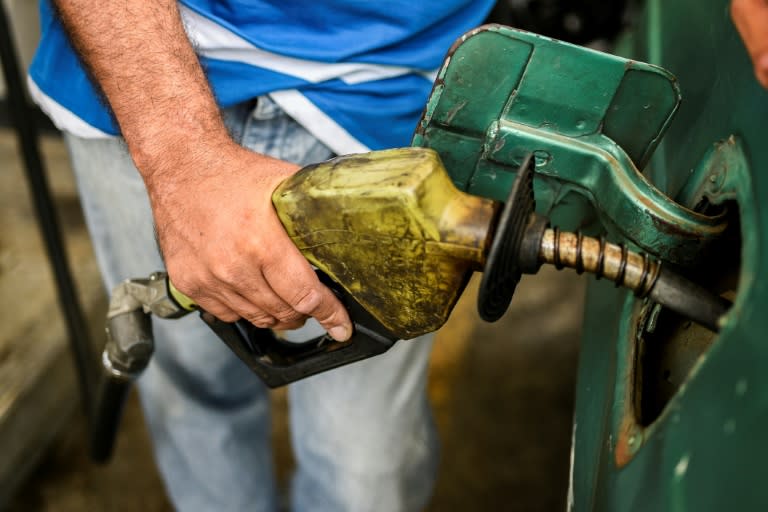How far can Venezuela go in raising price of world's cheapest gas?

In Venezuela's inflation-hit economy, a single US dollar can buy 3.5 million liters of gasoline -- an absurdity that the government says it will tackle with a hike in the cost of state-subsidized fuel. But just how far can President Nicolas Maduro go without getting his fingers burned? - Subsidized gas - Maduro announced on July 29 plans to adjust the price of gasoline and regulate sales based on the so-called "fatherland card," an electronic card that provides access to subsidies. As a first step the government began a census of motor vehicles, set to end on Sunday. A liter of 91-octane gasoline currently costs one bolivar, while 95-octane gas costs six. By contrast, a single egg in Venezuela's hyperinflation ravaged economy -- estimated by the IMF at one million percent in 2018 -- costs 200,000 bolivars. A dollar on the country's black market is currently trading at 3.5 million bolivars. Experts say the retail price of gasoline covers just between two and four percent of its cost of production. Maduro has kept details of the fuel price adjustment under wraps, but he said that "we are paying to throw it away ... we need to move to a rational usage." Yet talking openly about cutting the gasoline subsidy has been a taboo since the 1989 riots known as the "Caracazo," which were triggered by a rise in fuel prices and left 300 people dead in Caracas and towns surrounding the capital. Even though the iconic late leader Hugo Chavez questioned the rock-bottom prices of state-subsidized fuel during his term in office between 1999 and his death in 2013, even he never touched them. In 2016, Maduro authorized the first price hike in 20 years, but only by between 1.328 percent and 6.566 percent, which made no impact on the derisory prices. The new adjustment will come at a time of profound stagnation, in an economy that has not stopped shrinking since 2014. - Inflationary subsidies - Fuel subsidies have cost the Venezuelan government $10 billion a year since 2012, petroleum expert Luis Oliveros told AFP. That has created a such a gaping hole in the budget that the government has tried to fill by printing more money, which in turn has created even higher inflation, Oliveros said. "It is a lie that increasing the price of fuel is an inflationary measure," he said. "The subsidies are hyperinflationary." The situation has only been made worsen by the drop off in oil production from 3.2 million barrels a day in 2008 to 1.5 million in 2018. That is why the operating capacity of refineries has fallen and gasoline imports have risen. In a perverse twist, there has been a decrease in the demand for fuel because 90 percent of Venezuela's public transport vehicles are out of operation because there cannot buy spare parts to keep them on the road, according to unions. Venezuela imports 33,600 barrels of gasoline and 36,000 barrels of diesel a day from the United States, according to the US Energy Information Agency. Maduro has yet to explain what happens to consumers who do not have a state-issued "fatherland card." With wages ravaged by hyper-inflation, it is unlikely prices will get anywhere near international levels. If they did, however, filling a gas tank would cost a Venezuelan two years of their minimum-wage income. "Prices are so far behind that no matter how big the increase in terms of percentage, they will still remain low," said Henkel Garcia, director of the Econometrica consultancy group. - Social 'blackmail' - Economist Luis Vicente Leon said the government will use greater subsidies in the "fatherland card" system to ensure that fuel is affordable for all cardholders. According to the opposition, this card is designed for the Socialist government to broaden its support base, which has been weakened by the economic crisis and longstanding shortages of food, medicine and basic goods. The 12 million Venezuelans with the cards -- a third of the population -- systematically receive food vouchers. "If they are already using food and medicine as a form of blackmail, then why not gasoline?" said Oliveros.


